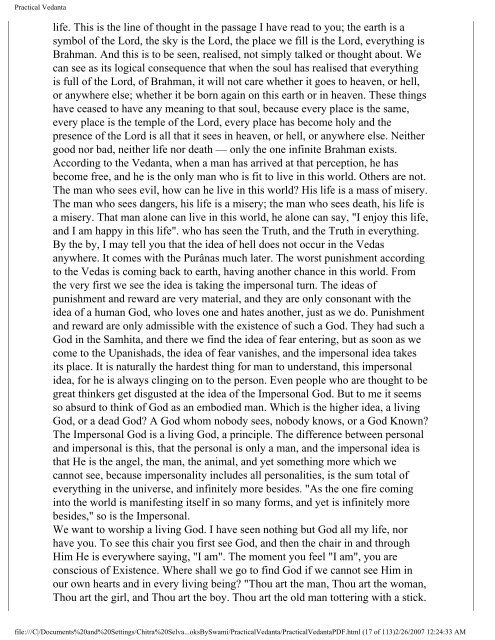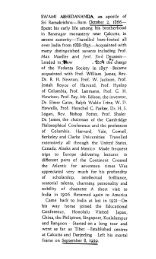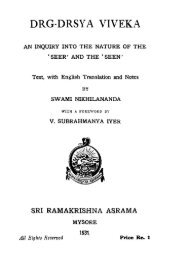<strong>Practical</strong> <strong>Vedanta</strong>In the Upanishads, we see a tremendous departure made. It is declared that theseheavens in which men live with the ancestors after death cannot be permanent,seeing that everything which has name and form must die. If there are heavenswith forms, these heavens must vanish in course of time; they may last millions ofyears, but there must come a time when they will have to go. With this idea cameanother that these souls must come back to earth, and that heavens are placeswhere they enjoy the results of their good works, and after these effects arefinished they come back into this earth life again. One thing is clear from this thatmankind had a perception of the philosophy of causation even at the early time.Later on we shall see how our philosophers bring that out in the language ofphilosophy and logic, but here it is almost in the language of children. One thingyou may remark in reading these books that it is all internal perception. If you askme if this can be practical, my answer is, it has been practical first, andphilosophical next. You can see that first these things have been perceived andrealised and then written. This world spoke to the early thinkers. Birds spoke tothem, animals spoke to them, the sun and the moon spoke to them; and little bylittle they realised things, and got into the heart of nature. Not by cogitation not bythe force of logic, not by picking the brains of others and making a big book, as isthe fashion in modern times, not even as I do, by taking up one of their writingsand making a long lecture, but by patient investigation and discovery they foundout the truth. Its essential method was practice, and so it must be always. Religionis ever a practical science, and there never was nor will be any theologicalreligion. It is practice first, and knowledge afterwards. The idea that souls comeback is already there. Those persons who do good work with the idea of a result,get it, but the result is not permanent. There we get the idea of causation verybeautifully put forward, that the effect is only commensurate with the cause. Asthe cause is, so the effect will be. The cause being finite, the effect must be finite.If the cause is eternal the effect can be eternal, but all these causes, doing goodwork, and all other things, are only finite causes, and as such cannot produceinfinite result.We now come to the other side of the question. As there cannot be an eternalheaven, on the same grounds, there cannot be an eternal hell. Suppose I am a verywicked man, doing evil every minute of my life. Still, my whole life here,compared with my eternal life, is nothing. If there be an eternal punishment, it willmean that there is an infinite effect produced by a finite cause, which cannot be. IfI do good all my life, I cannot have an infinite heaven; it would be making thesame mistake. But there is a third course which applies to those who have knownthe Truth, to those who have realised It. This is the only way to get beyond thisveil of Mâyâ — to realise what Truth is; and the Upanishads indicate what ismeant by realising the Truth.It means recognising neither good nor bad, but knowing all as coming from theSelf; Self is in everything. It means denying the universe; shutting your eyes to it;seeing the Lord in hell as well as in heaven; seeing the Lord in death as well as infile:///C|/Documents%20and%20Settings/Chitra%20Selva...oksBySwami/<strong>Practical</strong><strong>Vedanta</strong>/<strong>Practical</strong><strong>Vedanta</strong>PDF.html (16 of 113)2/26/2007 12:24:33 AM
<strong>Practical</strong> <strong>Vedanta</strong>life. This is the line of thought in the passage I have read to you; the earth is asymbol of the Lord, the sky is the Lord, the place we fill is the Lord, everything isBrahman. And this is to be seen, realised, not simply talked or thought about. Wecan see as its logical consequence that when the soul has realised that everythingis full of the Lord, of Brahman, it will not care whether it goes to heaven, or hell,or anywhere else; whether it be born again on this earth or in heaven. These thingshave ceased to have any meaning to that soul, because every place is the same,every place is the temple of the Lord, every place has become holy and thepresence of the Lord is all that it sees in heaven, or hell, or anywhere else. Neithergood nor bad, neither life nor death — only the one infinite Brahman exists.According to the <strong>Vedanta</strong>, when a man has arrived at that perception, he hasbecome free, and he is the only man who is fit to live in this world. Others are not.The man who sees evil, how can he live in this world? His life is a mass of misery.The man who sees dangers, his life is a misery; the man who sees death, his life isa misery. That man alone can live in this world, he alone can say, "I enjoy this life,and I am happy in this life". who has seen the Truth, and the Truth in everything.By the by, I may tell you that the idea of hell does not occur in the Vedasanywhere. It comes with the Purânas much later. The worst punishment accordingto the Vedas is coming back to earth, having another chance in this world. Fromthe very first we see the idea is taking the impersonal turn. The ideas ofpunishment and reward are very material, and they are only consonant with theidea of a human God, who loves one and hates another, just as we do. Punishmentand reward are only admissible with the existence of such a God. They had such aGod in the Samhita, and there we find the idea of fear entering, but as soon as wecome to the Upanishads, the idea of fear vanishes, and the impersonal idea takesits place. It is naturally the hardest thing for man to understand, this impersonalidea, for he is always clinging on to the person. Even people who are thought to begreat thinkers get disgusted at the idea of the Impersonal God. But to me it seemsso absurd to think of God as an embodied man. Which is the higher idea, a livingGod, or a dead God? A God whom nobody sees, nobody knows, or a God Known?The Impersonal God is a living God, a principle. The difference between personaland impersonal is this, that the personal is only a man, and the impersonal idea isthat He is the angel, the man, the animal, and yet something more which wecannot see, because impersonality includes all personalities, is the sum total ofeverything in the universe, and infinitely more besides. "As the one fire cominginto the world is manifesting itself in so many forms, and yet is infinitely morebesides," so is the Impersonal.We want to worship a living God. I have seen nothing but God all my life, norhave you. To see this chair you first see God, and then the chair in and throughHim He is everywhere saying, "I am". The moment you feel "I am", you areconscious of Existence. Where shall we go to find God if we cannot see Him inour own hearts and in every living being? "Thou art the man, Thou art the woman,Thou art the girl, and Thou art the boy. Thou art the old man tottering with a stick.file:///C|/Documents%20and%20Settings/Chitra%20Selva...oksBySwami/<strong>Practical</strong><strong>Vedanta</strong>/<strong>Practical</strong><strong>Vedanta</strong>PDF.html (17 of 113)2/26/2007 12:24:33 AM
- Page 1 and 2: Practical VedantaPractical VedantaP
- Page 3 and 4: Practical Vedantaworld. If I am a s
- Page 5 and 6: Practical Vedantadifference is only
- Page 7 and 8: Practical VedantaThe ideal of faith
- Page 9 and 10: Practical Vedantamoment of our live
- Page 11 and 12: Practical Vedantaof the Christs and
- Page 13 and 14: Practical Vedanta"This life is Brah
- Page 15: Practical Vedantadark fifteen days,
- Page 19 and 20: Practical Vedantaeverything would b
- Page 21 and 22: Practical Vedantait is only through
- Page 23 and 24: Practical Vedantawhich is that subt
- Page 25 and 26: Practical Vedantanoumenon and pheno
- Page 27 and 28: Practical Vedantato which is the be
- Page 29 and 30: Practical VedantaAbsolute.The finit
- Page 31 and 32: Practical Vedantawhich is not the q
- Page 33 and 34: Practical Vedantaexperience that th
- Page 35 and 36: Practical Vedantafulfilled. The Jiv
- Page 37 and 38: Practical Vedantabetween the pure r
- Page 39 and 40: Practical Vedantacome out straight.
- Page 41 and 42: Practical Vedantawar with one anoth
- Page 43 and 44: Practical Vedantanobody could under
- Page 45 and 46: Practical VedantaMy idea, therefore
- Page 47 and 48: Practical Vedantathe same methods.
- Page 49 and 50: Practical Vedantavarious minds, all
- Page 51 and 52: Practical Vedantabrotherhood; but t
- Page 53 and 54: Practical Vedantabrotherhood, but w
- Page 55 and 56: Practical Vedantawe all go with ves
- Page 57 and 58: Practical Vedantareason. What can y
- Page 59 and 60: Practical Vedantabeen preached in t
- Page 61 and 62: Practical Vedantathe husband kisses
- Page 63 and 64: Practical Vedantaof the knowledge a
- Page 65 and 66: Practical Vedantafor those who only
- Page 67 and 68:
Practical Vedantasun exists because
- Page 69 and 70:
Practical Vedantaof death was pleas
- Page 71 and 72:
Practical VedantaGod. We must learn
- Page 73 and 74:
Practical Vedantaa plague comes, it
- Page 75 and 76:
Practical VedantaAtman? "As with a
- Page 77 and 78:
Practical Vedantathat immortal One,
- Page 79 and 80:
Practical Vedantaand the third egoi
- Page 81 and 82:
Practical VedantaWitness of the uni
- Page 83 and 84:
Practical VedantaPractical Vedanta1
- Page 85 and 86:
Practical Vedantaeternal ; every ot
- Page 87 and 88:
Practical Vedantafaculty, Buddhi, w
- Page 89 and 90:
Practical VedantaPractical Vedanta1
- Page 91 and 92:
Practical Vedantastepping-stone to
- Page 93 and 94:
Practical Vedantarecognition? Findi
- Page 95 and 96:
Practical Vedantasentient." This is
- Page 97 and 98:
Practical Vedantaessentially differ
- Page 99 and 100:
Practical Vedantaexistence is limit
- Page 101 and 102:
Practical Vedantalive, for I am lif
- Page 103 and 104:
Practical Vedantasee from Kapila's
- Page 105 and 106:
Practical Vedantalimitation, but th
- Page 107 and 108:
Practical Vedantaperfect, infinite,
- Page 109 and 110:
Practical Vedantaindividuality, of
- Page 111 and 112:
Practical Vedantarepeat [something]
- Page 113:
Practical Vedantaperson who dies in
















